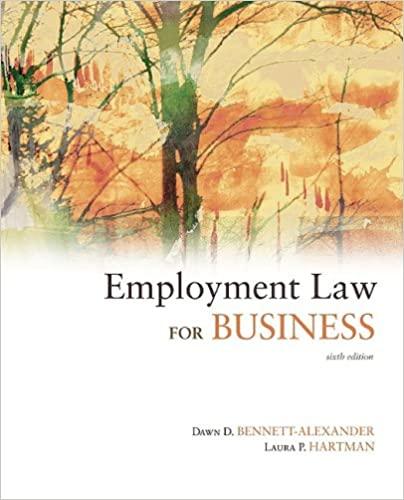Question
This is the second time I have asked this question, the first time I was given the answers to a criminal case and the case
This is the second time I have asked this question, the first time I was given the answers to a criminal case and the case is a labor law case. Please follow the instructions if you undertake to answer.
The question is related to a brief labor law case in Spanish, you can either read it in Spanish or translate it for its brevity. Cases usually have 50 pa.ges or more, this one has 20, including covers, notes and references. Instructions: Summarize legal case 2023 TSPR 143 No. TS-14,201 Parties In re: Yuri J. Valenzuela Flores Per Curiam Speaker found at: https://dts.poderjudicial.pr/ts/2023/2023tspr86.pdf , following the OUTLINE OF HOW TO SUMMARIZE A CASE: CITATION: Here you must write the citation of the case that you were given to summarize. Example: 123 DPR 213 (213 is the volume #, DPR the legal source and 213 the page # Example: 99 JTS 12 (99 is the year, JTS the source and 12 the # that makes the case that year) Example: 2004 TSPR 1 (2004 is the year, TSPR is the source and 1 is the number that makes the case in that year) CASE NAME: Criminal Case: People v. Calderon Civil Case: Rodriguez v. Martinez Ex Parte Case: Ex Parte Mauleon Minors Case: People in the interest of the minor E.R.R In re Case: In re Ambar Ramos NAME OF REPORTING JUDGE: This is the name of the Reporting Judge in the Supreme Court decision, not the Judge who heard the case in the Court of First Instance. This name is found at the beginning or end of the opinion. PER CURIAM: This appears when the judges wrote the opinion. FACTS: Brief what happened in the case. Do it in your own wor.ds, two or three sentences. DECISION OF THE COURT OF FIRST INSTANCE: This is known as the DECISION OF THE COURT A QUO. The Court of First Instance is the one that presents the case for the first time and the subsequent courts to which it went on appeal before reaching the Supreme Court. Example: In cases under the old Judiciary Law, the cases may have started in the District Court, then gone to the Superior Court, Appellate Court, until reaching the Supreme Court. Under the new Judiciary Law, they may have started in the Municipal Court, Superior Court, Appellate Court, until reaching the Supreme Court. Example: The District Court finds a person guilty of breach of peace. The Superior Court confirms it, the Court of Appeals confirms the Superior Court, and the Supreme Court reverses it, freeing the accused. CONTROVERSY: It is also known as the ISSUE. There may be more than one controversy. It is the issue for which the case reached the Supreme Court. Example: If the prosecutor managed to establish beyond a reasonable doubt the constitutive elements of the crime of breach of peace. (CRIMINAL) Example: If the plaintiff established the cause of action for divorce for cruel treatment. (CIVIL) It is easier to always put it in the form of a question, since the answer is YES or NO. In some cases they tell us what the controversy is at the beginning of the discussion. SUPREME COURT DECISION: It is the decision of the Supreme Court: REVOCATE, CONFIRMS or MODIFIES. If it is a CERTIORARI, it grants or denies the issuance of the writ (case). BASIS: These are the legal reasons for which the Supreme Court resolves, as it does. They are the doctrines of law that are established in the opinion of the Supreme Court. COMMENTS: Here you can make comments about the case that you consider relevant, contextualizing the case to Puerto Rican jurisprudence. Source: Cite the source of the case following the AP.A format for legal cases.
Step by Step Solution
There are 3 Steps involved in it
Step: 1

Get Instant Access to Expert-Tailored Solutions
See step-by-step solutions with expert insights and AI powered tools for academic success
Step: 2

Step: 3

Ace Your Homework with AI
Get the answers you need in no time with our AI-driven, step-by-step assistance
Get Started


